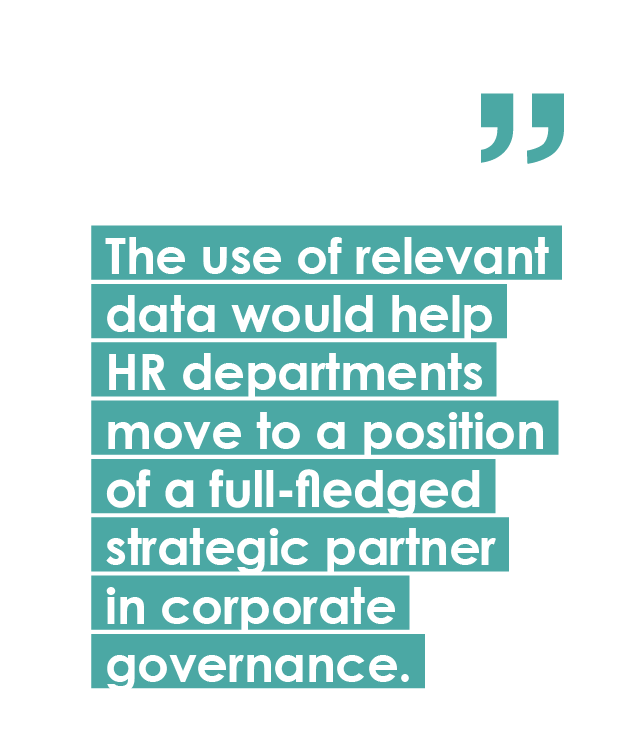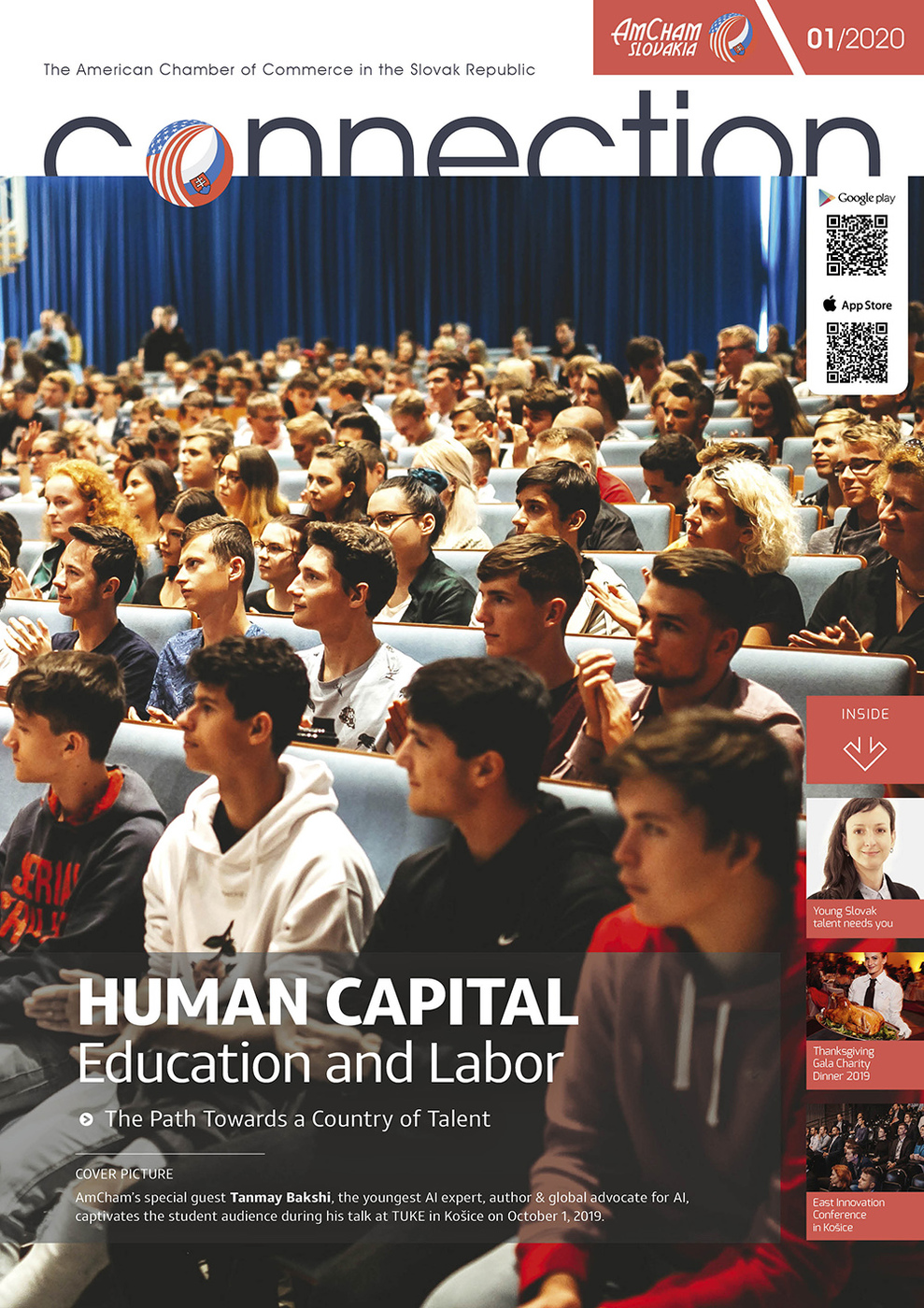Companies need to focus on one of the most important global trends, i.e. technological progress, and be able to process information and data effectively to achieve high quality in decision making. HR departments are facing the challenge of how to transform the quantity of data they possess into relevant metrics that lead companies to better strategies.
Data analytics turns HR into a well-rounded strategic partner
Over the past three years, the profit from each euro invested in employees has declined, whereas the ratio of personnel costs to total costs and companies’ investment in training per capita is rising. At the same time, the cost of employee benefits increases as well as the investment of companies into their employees. These conclusions stem from the long-term HR Controlling study, conducted by PwC, which measures the effectiveness of HR management in companies using 90 parameters (KPIs) in the areas of organizational structure, financial performance and productivity, compensation and benefits, organizational behavior, resourcing, talent management, learning and development and support departments.
Unfortunately, the HR department is very rarely perceived to be intensively involved in company data and performance indicators. In companies, metrics are determined primarily by financial departments which provide background information for top management decisions. The use of relevant data would help HR departments to argue in the implementation of proposals and move them to the position of a full-fledged strategic partner in corporate governance.
Setting up relevant HR Controlling indicators can support the decisions of HR managers in their discussions with top management. It is easier to ask for more investment in education when there is relevant evidence that other companies in the same sector invest significantly more in their employees. If the statements are backed up by financial impact and productivity, the persuasive power can increase even more. HR Controlling serves as a good argument tool for understanding the current situation in the company or market.
 Insufficient amount of relevant data on employee views and needs
Insufficient amount of relevant data on employee views and needs
CEOs need high-quality data to make good decisions. However, it has been apparent for a long time that they are not receiving data in the required quality. Over the last ten years, the gap between the data CEOs require and what they receive has not changed globally. According to PwC CEO survey, the majority of CEOs stated that the most important data for decision making include data about the preferences of their customers and employees, information about brand and reputation, financial forecasts and projections and competitors’ performance data.
Due to poor data reliability (e.g. errors and incomplete data), unavailability of fixed data, lack and unwillingness of data sharing, CEOs do not receive the information they require to make well-informed decisions. Among other reasons that hinder the possibility of high-quality choices were also insufficient analytical talent and the inability to quantify external information.
Engagement surveys as a priority in HR management
In 2018, mainly due to the growth of Slovak economy and related low levels of unemployment, the recruitment and selection of employees was clearly in the first place among the priorities of almost every HR department. In 2019, the employers’ priority is the retention of employees, as in the view of the slowdown in economic activity, employers are cautious in hiring new employees. Therefore, employers carefully focus on selection of engagement surveys to receive relevant data on employees’ views that will help them address relevant issues and prepare fitting action plans.
Gamification of development goes “hand in hand” with satisfaction of employees
Every company needs to ensure that its employees, mainly at the beginning of their employment, go through compulsory regular trainings on various topics - information security, occupational health and safety (OHS), fire protection, code of conduct, first aid, compliance, etc. Most companies deal with compulsory education by computer training because they are more effective in terms of time investment, able to reach a wider audience and cheaper compared to classroom trainings. Unfortunately, companies do not usually measure feedback to these compulsory trainings. The only goal is to pass the test at the end of the course.
One concept that could help to get important information to employees in a fun way and learn something is gamification. The entire content of the training is provided in the form of a computer game where all tasks can be accomplished, and rewards are collected. Well-prepared games contain videos, various endings, randomly placed questions and tasks. Comparison to colleagues is part of the game, therefore the motivation to play again and earn more points increases. While gamification is designed to train individuals, the simulation is suitable as a collective game instead of the classic group training. The simulation game is usually more technical, has its rules and requires longer preparation, mainly because of the technical equipment. On the other hand, the simulation is completely different each time and each game is unique.
Furthermore, modern systems include metrics to measure the success of tests, processes, and training methodologies, and allow you to customize your outputs to meet internal or legislative requirements.
Availability of key skills among HR professionals
To sum up, HR departments face significant challenges that require an adjustment of the skill set required for their work in order to help improve the quality of decision making on company level. The importance of HR change management related to digital transformation and solid data analytics skills together with navigating through different information channels continues to increase. These skills will help companies enhance the ability to retain talent and provide pleasant employee experience that remain top priorities in HR management.
Data analytics in HR management and its impact on the quality of decision making
The cooling of Slovak economy is reflected in a slowdown of key Slovak industries. Confidence in the growth of companies has decreased and cost-cutting initiatives have started to prevail again in business plans in Slovakia and worldwide.
Human Capital: Education and Labor
- Young Slovak talent needs you
- Serious issues, not too seriously…
- What should school teach us - through the eyes of a thirteen year old girl
- The what and how of Slovak education system
- The evidence based education reform of the Learning Makes Sense initiative
- Uniting forces to give Slovak education a needed boost
- The taboo called entrepreneurship education
- Strengthening the Transatlantic bond
- Solve your problems by helping others
- What is the cost of termination of employment?
- Trust is essential for a successful company
- Employer branding is not only about hiring
- Agility isn´t a new Hollywood diet
- Data analytics in HR management and its impact on the quality of decision making
- Humans wanted: Robots need you




Follow us